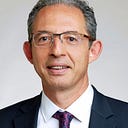I’m deeply touched and honored to be invited to write these few words on behalf of the Institute of Biotechnology and Genetic Engineering Alumni Association (IBGEAA) to celebrate the 12 years of professional life of Prof. Md. Tofazzal Islam at Bangabandhu Sheikh Mujibur Rahman Agricultural University (BSMRAU).
My dear friend and collaborator Md. Tofazzal Islam is a kindred spirit to me. Our first contact was professional at international conferences, but it’s through social media, primarily Facebook at first, that I started to know him. It was evident to me that Tofazzal was an engaged, positive and can-do scientist, traits that I immensely respect — our world isn’t advanced by people who do nothing and sit and complain. I also came to witness, first through social media, the caring mentoring side of Tofazzal, who has often published supportive posts about his students and team members, male and female alike. This is another trait I hugely respect, a successful leader is a generous leader. Thirdly, through his engagement with plant pathology and his intense desire to help improve the livelihood of farmers, it was evident that Tofazzal’s generosity extends beyond his team members. People who want to change the world aren’t afraid of sharing their knowledge and data, quite the opposite.
This is the context under which our incredible and deeply satisfying partnership started in February 2016. When news of a destructive wheat disease outbreak in Bangladesh spread out, we spontaneously teamed up and volunteered to apply the latest genomics technology to identify the precise nature of the pathogen. From intuition, I wasn’t the least surprised that Tofazzal would immediately embrace the open science concept and indeed he immediately understood the power that open science can have when applied to plant health emergencies. Trust me, I know from personal experience that many wouldn’t have reacted as enthusiastically as Tofazzal did. He had the vision to see the potential of doing business differently compared to the traditional conservative ways of classical plant pathology.
But “vision without action is merely a dream”. The way Tofazzal sprung into action, mobilized his team, extension specialists and what felt to us at the time the entire agricultural community of Bangladesh was equally impressive. Samples were collected in record time and reached us in no time. And OpenWheatBlast was born, and as you know, the rest is history.
I don’t need to write more about wheat blast here. I think you know more than I do about this fearsome enemy we are fighting. Progress was made but there is still a lot of work to be done through genomic surveillance, gene editing, classical breeding and varietal selection. But wheat blast changed the world in other ways too. It provided an exemplar of this beautiful idea that we could all team up and spontaneously volunteer from Bangladesh, UK, Japan, Switzerland, Brazil, France and other corners of the world to spontaneously work together, share data and knowledge to help solve problems. It’s a beautiful rewarding vision especially in this time when war rages and the world seem fractured into ideologically divided factions. We, as scientists, share ideals to improve society. We are in the business of knowledge. Why should we ever hoard it?
And this exemplar is serving as The Model for how open science is crucial for tackling plant health emergencies. Anywhere from the policy paper on “Global Surveillance System for Crop Diseases” to the “Code of ethics for plant health emergencies” that the International Society for Plant Pathology (ISPP) is due to vote on at its Congress in 2023, we have changed the ways of plant pathology my friend.
I simply want to conclude with a quote from the nomination of Tofazzal as a Fellow of the American Phytopathological Society (APS):
“Prof. Md. Tofazzal Islam is a world-class scientist and academic scholar and, in addition, is dedicated to open science — a rather unusual position among scientists from developing parts of the world. He has shown evidence of leadership and visionary work in his country of origin and, therefore, he is precisely the sort of individual the APS should recognize to highlight its international reach.”
Happy 12 years my friend, and I wish you the very best for the next 12 years and beyond!
Addendum
As I was writing these words in June 2022, Bangladesh was hit with catastrophic flooding due to heavy monsoon rainfall. Read how climate change is making such disastrous events more frequent.
Cite as: Kamoun, S. (2022). Open science: a letter to a friend. Zenodo https://doi.org/10.5281/zenodo.6757396
